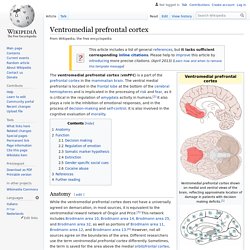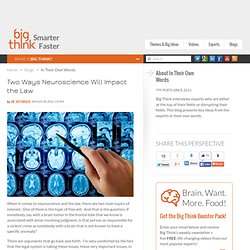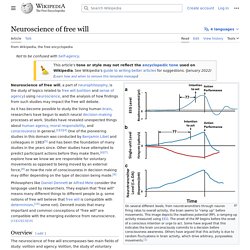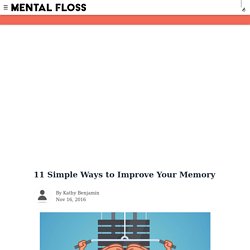

Ventromedial prefrontal cortex. The ventromedial prefrontal cortex (vmPFC) is a part of the prefrontal cortex in the mammalian brain.

The ventral medial prefrontal is located in the frontal lobe at the bottom of the cerebral hemispheres and is implicated in the processing of risk and fear. It also plays a role in the inhibition of emotional responses, and in the process of decision making. Anatomy[edit] While the ventromedial prefrontal cortex does not have a universally agreed on demarcation, in most sources, it is equivalent to the ventromedial reward network of Ongur and Price.[2] This network includes Brodmann area 10, Brodmann area 14, Brodmann area 25, and Brodmann area 32, as well as portions of Brodmann area 11, Brodmann area 12, and Brodmann area 13.[3] However, not all sources agree on the boundaries of the area.
THE BRAIN FROM TOP TO BOTTOM. Des scientifiques ont mis au point la première carte interactive du cerveau. Des scientifiques américains viennent de révéler la première carte détaillée du cerveau jamais réalisée, après quatre ans de recherche intensive, rapporte le New Scientist.

Bien sûr, il existe déjà des cartes du cerveau et ce depuis le 19e siècle, mais celles-ci décrivent des zones anatomiques (où est le lobe frontal, où est l'hippocampe, etc). Two Ways Neuroscience Will Impact the Law. When it comes to neuroscience and the law, there are two main topics of interest.

One of them is the topic of free will. Stimulating brain cells stops binge drinking, animal study finds. BUFFALO, N.Y. – Researchers at the University at Buffalo have found a way to change alcohol drinking behavior in rodents, using the emerging technique of optogenetics, which uses light to stimulate neurons.

Their work could lead to powerful new ways to treat alcoholism, other addictions, and neurological and mental illnesses; it also helps explain the underlying neurochemical basis of drug addiction. The findings, published in November in Frontiers in Neuroscience, are the first to demonstrate a causal relationship between the release of dopamine in the brain and drinking behaviors of animals. Research like this, which makes it possible to map the neuronal circuits responsible for specific behaviors, is a major focus of President Obama’s Brain Research for Advancing Innovative Neurotechnologies initiative, known as BRAIN. Décodage du cerveau du consommateur : pourquoi achetons nous ? Vers le cerveau tablette (?) La cacophonie gouvernementale et les débats à l'Assemblée concernant l'examen de la PMA ont remis en avant le rôle méconnu du CCNE.

Le Monde.fr | • Mis à jour le | Par Simon Piel La cacophonie gouvernementale sur le calendrier d'examen de la PMA rapidement exploitée par l'opposition a remis en avant le rôle méconnu du Comité consultatif national d'éthique (CCNE). Après des débats sur la portée de ses avis, la porte-parole du gouvernement, Najat Vallaud-Belkacem, a finalement indiqué que sa position "vient éclairer le débat uniquement" rappelant ainsi que selon ses statuts, celui-ci n'est que consultatif. How Does the Brain Retain Information? Comment le cerveau assimile une nouvelle langue. Apprendre sa propre langue est déjà un défi cérébral en soi.

Alors, qu'en est-il quand il faut maîtriser une autre langue que la sienne ? Et pourquoi est-il si difficile d'apprendre une langue appartenant à une autre famille que la sienne, alors que nous manipulons finalement assez bien d'autres codes complexes comme les mathématiques par exemple ? Comment le cerveau fait-il pour maîtriser une langue? Même si les recherches récentes montrent que de nombreuses régions de notre cerveau s'activent lors de la moindre opération mentale, les fonctions utiles au langage trouvent leur source dans deux aires qui ont donc une importance primordiale : l'aire de Wernicke et l'aire de Broca. MSNBC - How to Think About the Mind.
How to Think About the MindNeuroscience shows that the 'soul' is the activity of the brain Sept. 27 issue - Every evening our eyes tell us that the sun sets, while we know that, in fact, the Earth is turning us away from it.

Neuroscience of free will. Neuroscience of free will is the part of neurophilosophy that studies the interconnections between free will and neuroscience.

As it has become possible to study the living brain, researchers have begun to watch decision making processes at work. Findings could carry implications for our sense of agency and for moral responsibility and the role of consciousness in general.[1][2][3] Relevant findings include the pioneering study by Benjamin Libet and its subsequent redesigns; these studies were able to detect activity related to a decision to move, and the activity appears to begin briefly before people become conscious of it.[4] Other studies try to predict activity before overt action occurs.[5] Taken together, these various findings show that at least some actions - like moving a finger - are initiated unconsciously at first, and enter consciousness afterward.[6] A monk meditates.
Overview[edit] Neurologist discovers 'dark patch' inside brains of killers and rapists. Scans reveal a patch at the front of the brain can be seen in people with records for criminal violenceGerman scientist who made the discovery classifies evil in three groups By Allan Hall In Berlin Published: 15:32 GMT, 5 February 2013 | Updated: 23:29 GMT, 5 February 2013.

11 Simple Ways to Improve Your Memory. Whether you want to be a Jeopardy!

Champion or just need to remember where you parked your car, here are 11 things you can do right now to turn your mind from a sieve into a steel trap. These days we’re all about things being faster. That’s why this advice is invaluable: When you really need to remember something, concentrate on it for at least 8 seconds. That can seem like a long time when you're running around trying to get a million things done, but it is worth it.
Studies have shown that 8 seconds is the minimum amount of time it takes for a piece of information to go from your short-term memory to your long-term memory.
Dr Paul Howard Jones - What is the Internet Doing to our Brains? Burundanga. What is Addiction? [Gabor Maté] 50 Ways To Boost Your Brain Power. 8 Things Everybody Ought to Know About Concentrating. “Music helps me concentrate,” Mike said to me glancing briefly over his shoulder. Mike was in his room writing a paper for his U.S. History class. On his desk next to his computer sat crunched Red Bulls, empty Gatorade bottles, some extra pocket change and scattered pieces of paper. In the pocket of his sweat pants rested a blaring iPod with a chord that dangled near the floor, almost touching against his Adidas sandals.
How Does the Brain Retain Information? The Brain-Information about the Brain.